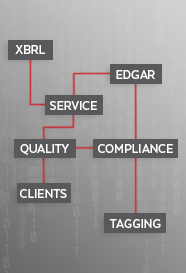In a recent article on the Compliance Week website, Tammy Whitehouse makes clear that while the SEC has recently issued new guidance for–and begun stricter enforcement of–XBRL quality, there remain legitimate concerns about the ultimate usefulness of the data. It is certainly true that the XBRL being filed by many providers that use automated software and by many companies creating their own XBRL using in-house software is flawed and riddled with simple errors. As a result, the lion’s share of the XBRL data currently available is of limited value to the investors and analysts for whom the data is primarily intended. Although the SEC has recently begun issuing comment letters in a first attempt to remedy the issues that diminish the value of XBRL data, Whitehouse says that some people “worry it won’t go far enough to fix the problems that prevent better use of open source financial statement data.”
RDG agrees. This was a good first step, but more needs to be done to enhance XBRL quality.
However, the primary takeaway from Whitehouse’s article is not that “XBRL has been a failure since the beginning.” Perhaps it has, but only if you insist on only looking backward. RDG agrees with Campbell Pryde, president and CEO of the XBRL U.S., which advances the goal of a high quality dataset of public companies’ financial information. In the article, Pryde acknowledges that there has “been very little communication from the SEC,” and as a result, there has been little “incentive for folks to get it correct.” However, he provides valuable perspective when he says: “It’s a cycle, and hopefully the SEC attention to this should start to break the cycle.”
Since the inception of the XBRL mandate, the SEC has been very deliberate (all too deliberate) in the gradual implementation of the requirement, and they continue to move slowly toward stricter enforcement of the necessary standards of XBRL quality. They are, however, moving in the right direction.
There will always be companies that wait for the SEC to take discernible enforcement actions before complying with certain regulations. But for those companies that want to remain in compliance and ahead of the SEC’s future enforcement—and that want to supply XBRL data that is useful to analysts and investors—there are some simple and cost effective solutions.
If you’re using an outsource provider for XBRL tagging that outsources the tagging or uses automated software to create quick-and-dirty XBRL, your code is sure to have a large number of errors and may not fly under the radar of the SEC’s XBRL RoboCop. RDG Filings is among the top five most active filing agents in the country, we are proud to have set the standards for both customer service and XBRL data quality, and we are thrilled to be able to offer this quality at significant savings over the other reputable providers. High quality XBRL data is not cost prohibitive. Contact us for a quote.
If you are using in-house software to create your own XBRL, and if you want a higher degree of confidence that your code is properly built, RDG’s XBRL Quality Assurance Department provides you with an independent, 3rd party review of your XBRL code, and our QA team of expert CPAs will ensure that your XBRL is not simply SEC Compliant, but that it satisfies the most up-to-date and strictest recommendations from the FASB, the AICPA, and the XBRL.US. Contact us for more information.
At this point, it is undeniable that the XBRL mandate is far from perfect. However, it is important to maintain perspective and to understand the SEC for what it is. It’s a large government bureaucracy that moves slowly but steadily. It may be plodding along, but the SEC is moving toward increased enforcement of XBRL quality. It is up to companies to be sure they are out in front of the SEC. RDG Filings can help.
Feel free to contact me any time.
Stewart Walker – SVP, Director of Sales
415.643.6017



